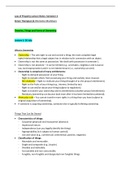Law of Property Lecture Notes: Semester 2
Simon Thompson & Khomotso Moshikaro
Theories, Things and Forms of Ownership
Lecture 1: 26 July
What is Ownership
• Ownership = The sole right to use and control a thing; the most complete legal
right/relationship that a legal subject has in relation to/in connection with an object.
• Ownership is not the same as possession. We dealt with possession in semester 1.
• Ownership is not absolute – it can be limited (e.g., servitudes, neighbour and nuisance
law, land expropriation) and it is not indeterminant (i.e., ownership can end).
• Ownership is comprised of many entitlements:
- Right to demand possession of your thing.
- Right to exclude others from possessing your thing and lawfully resist invasion.
- Rei vindicatio = Right to vindicate your thing (thought of as the pinacol entitlement).
- Right to the fruits of your thing (e.g., interest, limited by tax).
- Right to use and/or abuse your thing (subject to regulation).
- Right to transfer your ownership and its entitlements (another pinacol entitlement).
- Residuary (ownership can bounce back even after it has been limited/encumbered).
• Nemo plus rule = You cannot transfer more rights in a thing than you have (subject to
original acquisition of ownership).
• If someone is acquiring ownership, someone else is typically forfeiting ownership.
Things That Can Be Owned
• Characteristics of things:
- Corporeal (physical) and incorporeal (abstract).
- Impersonal nature.
- Independence (can you legally identify the thing).
- Appropriability (is it subject to human control).
- Use and value (e.g., commercial, sentimental, positive, negative).
• Classification of things:
- Moveable and immovable.
- Single and composite (e.g., bicycle).
- Divisible and indivisible.
- Consumable and non-consumable.
- Fungible, non-fungible and designated non-fungible things.
,Forms of Ownership
• Individual ownership/freehold title:
- Ownership vests in one person.
- The owner alone has the entitlements of ownership.
• Co-ownership:
- Owners have undivided shares, which can be divided into equal or unequal portions.
- It can be free (you can transfer ownership of your share; should the other owner be
unhappy, they can approach the court for a partition order) or bound (you cannot
unilaterally transfer ownership of your share).
- Use is generally proportional to the ownership share (Pretorius).
• Communal ownership:
- Ownership rights vest in the community or the head/chief of the community.
Original Acquisition of Ownership
Lecture 2: 28 July
Original Acquisition of Ownership
• Original acquisition involves a reallocation of ownership.
• Happens ex-lege (by operation of the law).
• The will of the previous owner is irrelevant.
• When the ownership right is reallocated, the pre-existing ownership right is terminated.
• Why do we allow original acquisition? It is a tug-of-war between the principle of
publicity (matching the underlying legal relationship between the person and the thing,
and how it appears on the surface), the principle of specificity (which protects private
ownership) and pragmatism (just having something doesn’t mean you’re the owner).
• There are several types of original acquisition.
Appropriation
• Applies to unowned things and abandoned things, not lost things. This must be inferred
from the factual circumstances (you must make an argument).
• How do we prove abandonment? The owner must have given up control with the
intention to relinquish their ownership.
• What constitutes possession? Corpus (effective physical control) and animus (intention
to acquire ownership at that point in time). See Recks v Mills.
, In Reck v Mills (1990), the Appellate Division had to consider the meaning of the physical
control requirement.
In Mills v Reck (1988), Mills had commenced a salvage operation during which he was trying
to harvest a large condenser from a shipwreck. Mills attached a rope and a buoy to the
condenser, after which Reck attempted to commence salvaging parts of the shipwreck too.
In the High Court, Mills obtained an interdict against Reck prohibiting him from interfering in
Mills’ salvage operation. Mills succeeded.
Reck appealed. On appeal, the Appellate Division decided that Mills had not yet established
the degree of control required to amount to “possession”. It is not enough, the court held,
to simply mark something out (as Mills had done with a rope and a buoy). Possession must
be such that the possessor must be in a position “to deal with the subject at [his] pleasure”
to the exclusion of all others. Some degree of actual control, rather than marking out, is
required. Given that Mills had not established the control required, Reck’s appeal was
successful.
Acquisitive Prescription
• Applies to owned property.
• If a person controls a thing openly, as if they were the owner, for an interrupted period
of 30 years, they become the owner.
• This must be unlawful possession of the thing (e.g., not a lease), but not illegal (e.g., you
cannot acquire state-owned land through acquisitive prescription).
• Acquisition through prescription can be interrupted by natural interruption (natural
disaster or the previous owner reclaims the thing) or civil interruption (court order).
• If the person who acquired the thing through prescription uses the mandament van
spolie or reacquires the property by other lawful means, within 1 year after natural
interruption, there is no disruption to the 30-year period.
• If litigation fails/is abandoned, any disruption to the 30-year period is ignored.
• If ownership is suspended (i.e., the true owner is incapacitated), any lost time (during
the 30-year period, in which the owner could have interrupted the acquisition of
ownership by another person) is added on at the end of the period.
Lecture 3: 2 August
Manufacture
• Applies to the creation of a nova species (new product) out of materials belonging
wholly or in part to another person, in the absence of an agreement governing the use
of the materials (i.e., no contract).




